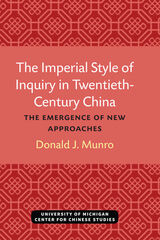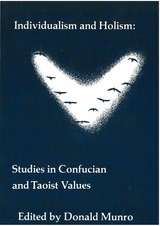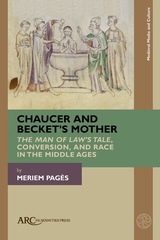2 books about Munro, Donald J.

The Imperial Style of Inquiry in Twentieth-Century China
The Emergence of New Approaches
Donald J. Munro
University of Michigan Press, 1996
How have traditional Chinese ways of thinking affected problem solving in this century? The traditional, imperial style of inquiry is associated with the belief that the universe is a coherent, internally structured unity understandable through the similarly structured human mind. It involves a reliance on antecedent and authoritarian models, coupled with an introspective focus in investigations, at some cost to objective fact gathering.
In contrast, emergent forms of inquiry are guided by the values of individual autonomy and new perspectives on objectivity. In the 1930s and 1940s, some liberal educators held the model of Western science in great esteem, and some scientists practicing objective inquiry helped to create an awareness in the urban areas of inquiry not directed by political values.
Drawing on philosophical, social science, and popular culture materials, Donald Munro shows that the two strains coexisted in twentieth century China as mixed motives. Many important figures were motivated by a desire to act consistently with the social values associated with the premodern or received view of knowledge and inquiry. At the same time, these people often had other motives, such as utilitarian values, efficiency, and entrepreneurship. Munro argues that while many competing positions can coexist in the same person, the seeds of the positive, instrumental value of individual autonomy in Chinese inquiry are beginning to compete in both scholarly and popular culture with other, older approaches.
[more]

Individualism and Holism
Studies in Confucian and Taoist Values
Donald J. Munro, Editor
University of Michigan Press, 1985
The notion of “individualism” inevitably creeps into the conversation of Americans who try to compare their country with China. It is something we supposedly have and prize which the Chinese do not now have nor probably ever had. For several generations, noncommunists and communists in China have excoriated individualism as the equivalent of selfishness. For them it is a morally insupportable value, not least because it is thought to fragment societies. Inasmuch as the word “individualism” defines a number of different, though related, value concepts in modern usage, the point of departure for our analysis will be the examination of each of these. This approach will enable us to judge exactly what it is we were supposed to have, whether or not the concept has played a role in Chinese society, past or present, and, if so, what significance has been attached to it.
The word “holism” rarely creeps into anyone’s conversation, except, perhaps, that of the sociologist or philosopher. It is a scholarly word. Yet there is considerable overlap between lay remarks about individual interest being subordinate to group interest and the scholar’s technical descriptions of what some holisms expect of people. The ideas suggested by the term are not exclusively scholarly. It seems to point to some Chinese ways of thinking about relations among individuals that contrast with our ways. But if anything, it is vaguer than “individualism.” [1]
[more]
READERS
Browse our collection.
PUBLISHERS
See BiblioVault's publisher services.
STUDENT SERVICES
Files for college accessibility offices.
UChicago Accessibility Resources
home | accessibility | search | about | contact us
BiblioVault ® 2001 - 2024
The University of Chicago Press









